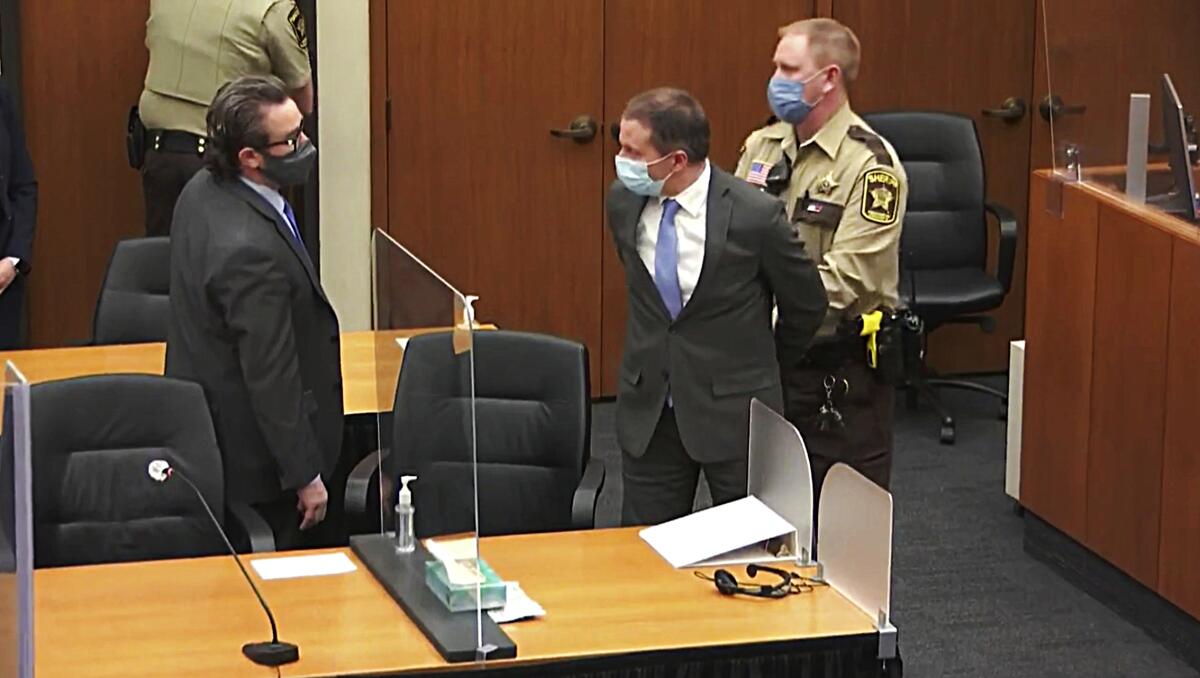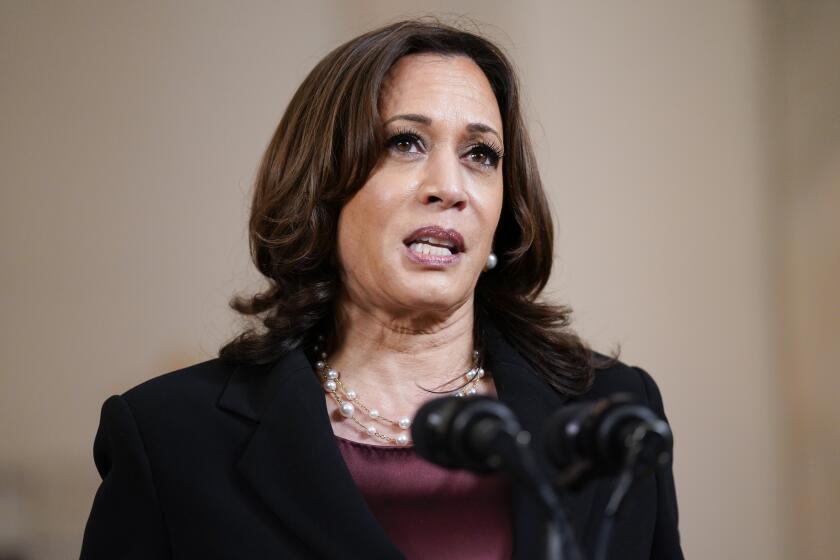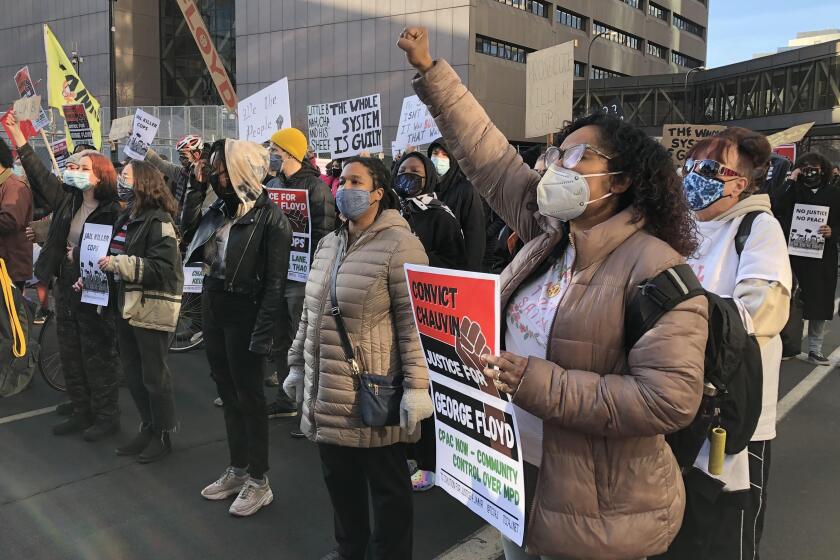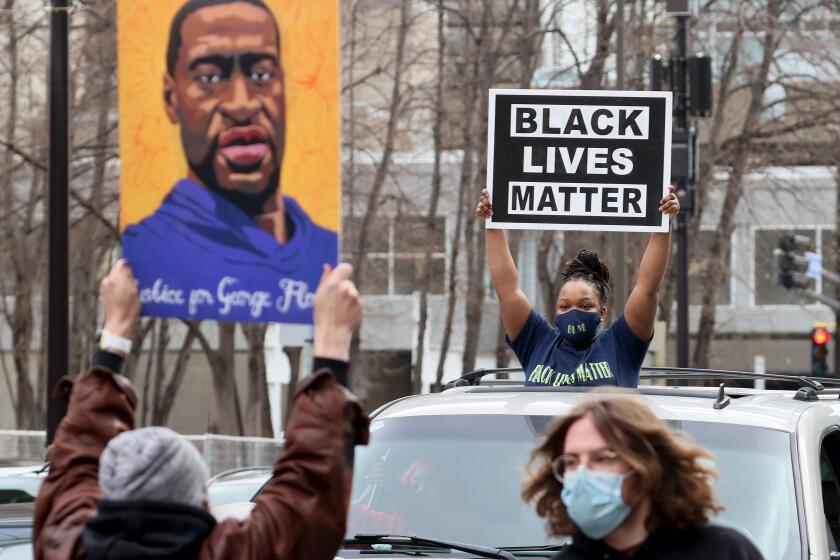‘Human being, not a political cause’: Will Floyd’s death, Chauvin conviction spur reforms?

- Share via
ATLANTA — Racial justice advocates and legal experts on Tuesday hailed the murder conviction of former Minneapolis Police Officer Derek Chauvin in the death of George Floyd, expressing hopes the case could spur broader police reforms and help crack the “blue wall of silence” often adhered to by police when one of their own commits a crime.
“This is a positive step in signaling that there can be accountability for police officers who kill,” said Mark Osler, a law professor at the University of St. Thomas School of Law in Minnesota.
The Hennepin County jury found Chauvin guilty on all three counts against him, nearly a year after the white officer knelt on the neck of Floyd, a Black man, for more than nine agonizing minutes, killing him and setting off a wave of nationwide racial justice protests.
Many longtime observers of law enforcement issues saw a decisive indictment not only of the individual in question — Chauvin — but of the nature of policing in America, particularly the pernicious racial inequalities that the case came to symbolize.
“Even though the system wasn’t on trial,” said Jonathan M. Smith, the executive director of the Washington Lawyers’ Committee for Civil Rights and Urban Affairs, “the whole system really was on trial.”
Those who have long followed similar cases said they were braced for disappointment.
Stephanie Whitehead, an associate professor of criminal justice at Indiana University East in Richmond, Ind., said that “I held my breath” waiting for the verdict.
“I feared this would end up like so many other cases involving police killings,” she said. “It was a clear-cut case, but so have others” been as well.
Former Police Officer Derek Chauvin’s conviction for murdering George Floyd has reenergized President Biden and Washington lawmakers aiming for reform.
Justin Bamberg, a South Carolina-based lawyer who has been involved in several cases involving shooting deaths at the hands of police, said he hoped the conviction marked “a turning point in civil rights, and just as important, opens the minds of law enforcement that you can be held accountable for your actions.”
Bamberg, who is Black, called the case a “great day for Mr. Floyd’s family, and everyone across America who believes in equal justice for all.”
In many quarters, though, there was sorrowful acknowledgment that the conviction brought little real solace.
“The first thing we need to remember is that George Floyd was a human being, not a political cause,” said the Rev. William H. Lamar IV, the pastor of Washington D.C.’s historic Metropolitan African Methodist Episcopal Church. “This is not justice; it is accountability.”
Justice, Lamar said, would be “living in a world where a police officer would not think it possible to do what was done to George Floyd with impunity.”
For some, even a hoped-for verdict reignited a sense of fury and despair.
“Derek Chauvin isn’t just a bad apple, and we need not treat him like one to feed our anger or soothe our fears,” said Maurice Mitchell, the head of the Working Families political party. He called Chauvin “the latest manifestation of the utter rot that modern-day policing has become.”
Racial justice advocates said they saw the outcome as a beginning, not an end.
“Justice has prevailed,” the NAACP tweeted, “but the work is not done!”
A jury can’t lead systemic change. As long as good cops protect bad ones, we’ll be in the same spot we were the day before Floyd died.
Several legal experts praised the prosecution’s courtroom presentation, pointing in particular to effective use of law enforcement officers as witnesses. Law professor Osler said the trial offered graphic proof of the “blue wall of silence crumbling.”
“You had not just the police chief, but you had other officers who testified consistently that what the officer did was wrong,” he said. “You had many different people with experience in the Minneapolis Police Department coming to a consensus that what Chauvin did was not consistent with his training.”
Others said the prosecution was wise to hew closely to what jurors saw with their own eyes: the harrowing video of Floyd’s dying moments on May 25, 2020.
“The prosecution did a good job of making it very simple,” said Brandon Garrett, a professor of law at Duke University. “When you watch that video and you see that Floyd was held for 9½ minutes, during which he posed no threat to anyone and was fully restrained — that’s simply not policing.”
The trial’s outcome carried powerful symbolic overtones for Black law enforcement personnel, including Gregory Tony, the first Black sheriff of Florida’s Broward County.
“Chauvin’s conviction is a reminder to all who wear a badge that we are not above the laws which we swore to protect,” he said in a statement. He said Floyd’s death “moved the consciousness of America like never before.”
Some commentary on the trial’s outcome, though, pointed to the bitter national divides that remain. Erick Erickson, a white conservative radio talk-show host based in Georgia, railed on Twitter about “wokevangelicals” he said were disappointed the outcome did not provide them with more reason to complain about injustice and racism.
The world reacts after a Minneapolis jury found former police Officer Derek Chauvin guilty for the May 2020 murder of George Floyd.
While this was a landmark policing trial, Garrett said the real significance would lie in whether it brought about enactment of broader police reforms at the federal and state level.
“Holding one officer accountable, whether civilly or criminally, doesn’t fix the system,” he said. “Criminal accountability after the fact doesn’t prevent egregious and improper police use of force.”
Floyd’s death, Garrett said, drew much-needed attention to the broader issue of “where and why policing happens” — how police interact with members of the community, and how handling of minor infractions can sometimes take such a horrifying turn.
“We shouldn’t be turning convenience store encounters or traffic stops into deadly encounters,” he said.
Jarvie reported from Atlanta, King from Washington and Kaleem from Los Angeles.
More to Read
Sign up for Essential California
The most important California stories and recommendations in your inbox every morning.
You may occasionally receive promotional content from the Los Angeles Times.















